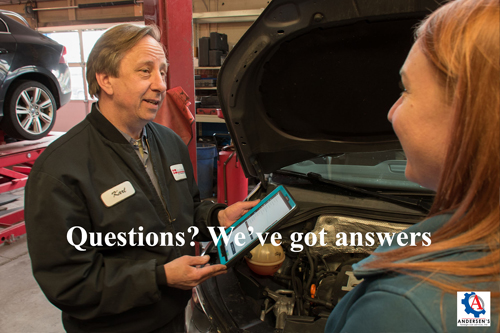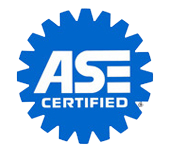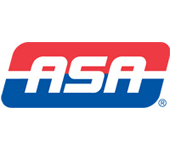Advice from Your Mechanic

Car Care Tips to Keep You On the Road
1. Change the oil at regular intervals.
We can't overstate how important oil is to your engine. Oil lubricates and cools. Oil pressure and flow control many key engine operations. To do its many jobs well, oil needs to be clean. But over time oil gets dirty and degrades. That's why you need to change it regularly. Tiny particles of dirt and metal fragments build up, which can cause engine wear. How? Particles rub like sandpaper on engine parts. Also, oil travels through narrow passages inside the engine and these can clog up, starving the engine of needed lubrication.
Dirty oil can lead to
- Increased engine wear
- Shorter engine life
- Lower gas mileage
- Poor running
- Loss of power
- Engine damage
- A potentially damaging increase in engine heat
- An engine that smokes
- Damage to expensive internal engine components
- Engine failure
Given our experience over decades of servicing cars in Colorado, we recommend changing the oil every 5,000 to 7,500 miles. Regular, more frequent oil changes will catch problems sooner and extend the life of your engine.
It's important to know that all oil isn't created equal. At Andersen's, we always use the oil specified by the manufacturer for your car. Today's highly tuned engines need oil that's designed to handle specific conditions. Generic oil that doesn't meet your car manufacturer's specs won't do the job.
Our advice: change the oil every 5,000 to 7,500 miles with oil that meets manufacturer's specs.
2. Change the oil filter at regular intervals along with the oil.
Oil is your engine's defense against heat and wear. The oil filter's job is to protect the oil. Conditions inside your engine are hot and dirty. Dirt from the air, byproducts of combustion and even tiny bits of metal as the engine wears work their way inside, accumulating in the oil over time. The oil filter sieves out this muck but it eventually clogs up. A clogged oil filter also impedes oil flow. If you keep driving with a clogged filter, the filter can actually rip apart and pieces of it can get in the engine, causing a whopper of a problem.
Oil filters aren't all the same and a generic filter likely isn't designed to meet your particular car's needs. At Andersen's, we always use the oil filter specified by the manufacturer.
Our advice: change the oil filter using the OEM filter every time you change the oil at intervals of 5,000 to 7,500 miles.
3. Pay attention to your Check Engine light.
Here's what your mechanic wants you to know about that pesky Check Engine light (aka Service Engine Soon): pay attention to it but don't freak out. Technically, that light is a message to you from your car's emissions control system. It's designed to alert you if the engine exceeds 1.5 times the emissions of the Federal tailpipe standards. There are hundreds of possible factors that will trigger it. If it turns on, more likely than not, you're fine to drive the car and it's not an emergency. But do get it checked out as soon as you can.
Our advice: If your Check Engine light comes on, it's trying to tell you something important. Pay attention to it and get your car in soon.
4. Learn how to read your Check Engine light.
Your 21st-century car is full of computers and computerized sensors. They make things happen and they monitor engine and other systems operations for problems. If your house had a "Check House" light, it might turn on if somebody left the refrigerator door open. You'd want to know if food was spoiling, right? Same with the Check Engine light. It's telling you that something needs attention. Here's how to read its messages:
1) The Check Engine light is flashing. Is the car also running poorly? This could be an "ignition misfire." You can drive your car gently but we recommend you get it in as soon as possible.
2) The Check Engine light came on but went off after a while. The engine computer monitors itself - if the computer gets a reading on an operating parameter it doesn't expect it will turn on the light. If the unusual reading doesn't persist, the computer may decide to turn the light off again. We can tell you what the computer found by reading "the code" for you the next time you're and advise you what to do about it.
3) The light stays on but the car seems to run fine. Again, your car is alerting you to a potential problem but it likely isn't an emergency. Get your car in within a few days when it's convenient and we'll check it out.
Our advice: if your Check Engine comes on, take note of what's happening. Get your car in as soon as you can and we'll get to the bottom of it.
5. Keep an eye on tire condition and tire wear.
It goes without saying that tires are what's between you, your passengers and the road. A flat tire can strand you. A worn tire or one that's too low can actually affect handling. A tire blow-out while you're driving can cause an accident. Avoid tire trouble with a quick walk around now and then. Here are some things to watch for:
- Is the tread worn? You can perform the "penny" or the "quarter" test to see how your tread is holding up (advice varies). You want to have a good amount of tread and you shouldn't be able to see the top of Lincoln's or Washington's head. Or, look for the "tire wear bars" -- horizontal rubber lines -- in the tread. If the tread is close to the same level as the bars or even with it, you need new tires.
- Are any tires low? A low tire will actually look flatter than the others and might even bulge out to the sides. Use a tire gauge to check tire pressure (PSI). You can top off the air in your tires but be careful not to overinflate. TIP: manufacturer's PSI numbers for your car are located inside driver's door on the pillar or inside the gas cap flap.
- Do you see any cracks in the sidewalls? Cracks are signs of a badly worn tire, as are cords or other material showing through where rubber should be. TIP: tires have a date code on the sidewalls (like the "born on" date code for beer). For instance, a tire with a code of 5017 was made in the 50th week of the year 2017. Tires should be replaced at age 7 regardless of appearance.
6. Don't overlook the other liquids in your car.
Oil isn't the only liquid in your car that needs attention. There's also transmission oil, coolant (aka antifreeze), power-steering fluid, brake fluid and washer fluid. Unless you're mechanically inclined, the only one we'd recommend dealing with yourself is washer fluid. Stop by any time and we'll be happy to show you how. The other liquids should be checked regularly as part of periodic maintenance by professionals but here are a few things to know:
- If you see a red or clear oily liquid on your garage floor, it's likely transmission oil. Get your car in right away to fix that leak.
- Engine oil is gold or black. That's likely another leak you'll want to get fixed right away.
- Coolant can be bright green, pink or blue and often has a peculiar sweet smell. Insufficient coolant can cause your engine to overheat. Get it checked if you detect it.
- Transmission oil is highly specialized these days and should only be replaced with oil specified by the manufacturer. Some transmissions have service intervals that include a filter change. Quick lube places aren't really geared up for the procedures required for checking or topping up transmission oil, so we don't recommend them.
- Manufacturers specify a particular coolant for your car. Chemical makeup of coolant is specific and can affect hoses and seals in the engine. The coolant for some cars, like Volkswagen, can't be mixed with other types. We don't recommend using a "so-called" universal coolant unless it's an emergency.
7. Going somewhere? Do the weekend trip walk-around.
Before you pack the car and head out for a getaway, do yourself and your passengers a favor and give your car a quick once-over:
- Check the oil level.
- Check and fill washer fluid.
- Check the wiper blades.
- Look at the tires - make sure none are low.
- Check the spare tire. Make sure there's air in it.
- Start the car and check the headlights and taillights.
Our advice: For a happy trip, make doing the "weekend trip walk-around" part of your pre-trip ritual. Oh, and don't forget to pack some water, the sun screen and some snacks.
1. Car Experiences Stalling
Is your car stalling or struggling to accelerate, no matter how hard you press the gas pedal? This isn't just inconvenient-it could indicate serious issues like a failing fuel pump or ignition problems, which are hazardous to face while driving. Don't wait and hope the problem resolves itself. Bring your vehicle in for a check up from our team of experts.
2. Trouble Steering
If your steering wheel becomes difficult to maneuver or your turns aren't as smooth as they used to be, it could signal an issue with essential steering components. Possible reasons could be low power steering fluid or other mechanical failures. It's crucial to address any problems that impact your ability to steer the car safely-seek immediate professional assistance at an auto repair shop.
3. Fluid Leaks
If your vehicle is leaving behind puddles of liquid, it's a sign you should investigate further. While water from air conditioning condensation is usually harmless, other fluids like oil, transmission fluid (red or brown), coolant (blue, yellow, green), power steering fluid, or brake fluid (thick but clear) indicate a potential leak in one of your car's critical systems. Addressing these leaks promptly can prevent further damage and ensure optimal performance. It's advisable to have these issues inspected and remedied by a specialist.
4. Worn Out Brakes
Brakes naturally wear down over time and if you notice them losing effectiveness or making unusual noises, it's a sign they may need attention. Screeching or squealing often indicates that the brake pads are worn and require replacement. Additionally, if your brakes shake or vibrate, this could point to a range of issues, from further wear on the pads to problems with the brake fluid or alignment.
5. Alignment Issues
If you've noticed your car's ride has become notably less smooth in the past few months, it might be time for a trip to the auto shop. A shaky or vibrating ride, especially at higher speeds, often stems from wheel or alignment issues.
Even after a proper wheel alignment, wheels can gradually shift, influenced by normal wear and tear or sudden incidents like accidents or unexpected bumps. Realignment is a straightforward procedure that can swiftly address the issue.
6. Uncommon Engine Noise
Engines are meant to run smoothly, so if yours starts to sound louder with age, that's normal. But if you hear sudden, unusual noises like grinding, popping, or growling-or if starting your engine becomes a struggle-it's a good idea to visit your local auto shop. Catching these warning signs early can help ensure your car stays in top shape!
7. Diagnostic Lights
Modern vehicles are equipped with engine diagnostic or check engine lights that sometimes activate not because of an immediate issue, but as reminders for routine checkups after a certain mileage has been reached.
In some instances, a glitch in the car's computer system might even trigger these lights without any actual problem. However, when these lights come on alongside other symptoms such as poor performance or strange noises, it's wise to get your car checked by a professional to ensure everything is running smoothly.
8. Unpleasant Exhaust
If you notice your exhaust emitting black smoke or strange odors, it might be time to check in with a mechanic. This could indicate something like a clogged filter or another issue with your car's systems, possibly even the catalytic converter. It's always a good idea to get these things looked at to keep your car running smoothly.
Stop by Andersen's Foreign Car Service located at 16289 W Colfax Ave in Golden, CO or call 303-278-8766 to talk to one of our friendly and professional technicians.
Reviews
|
|
|
|













